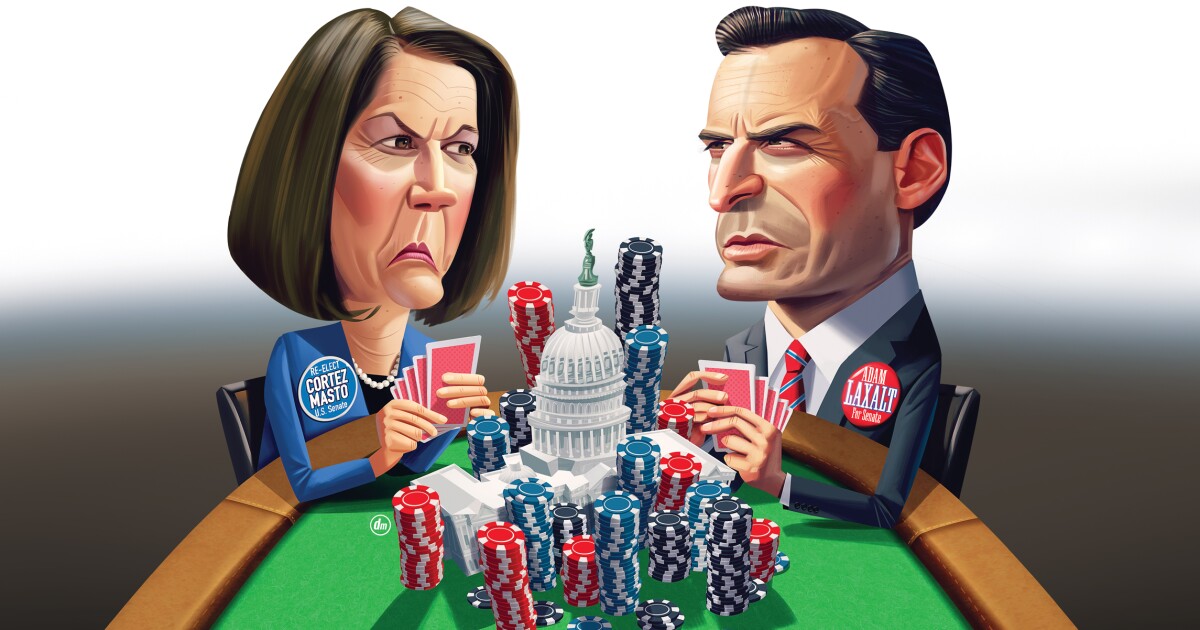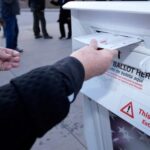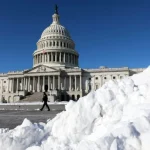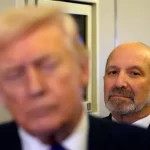

Reps. Steven Horsford and Dina Titus both know what it’s like to be on the losing end of a midterm election wave. The Democratic House members from Nevada may each soon have the unenviable experience of going through it twice.
Horsford, Titus, and Democratic Rep. Susan Lee all face fierce GOP challenges on Nov. 8 for their Las Vegas-area House seats. The Nevada seats are an important element of House Republicans’ plans to nab the majority, which requires a net pickup of only six seats in the 435-member chamber.
Nevada is even more pivotal to Senate Republicans’ quest for a majority in the next Congress. Democratic Sen. Catherine Cortez Masto is seeking a second, six-year term. But she’s consistently running behind in polls against her Republican rival, former state Attorney General Adam Laxalt.
ANALYSIS: NEVADA EMERGING AS TIGHTEST 2022 SENATE RACE AND THAT’S A PROBLEM FOR DEMOCRATS
Losing the Nevada Senate seat would seriously dent Democratic chances at keeping the 50-50 majority they hold thanks to Vice President Kamala Harris’s tiebreaking vote. Not to mention Democratic efforts to expand their Senate majority to the point that they could bust the chamber’s filibuster rule and pass legislation on a party-line vote, rather than the 60-vote threshold that’s effectively in place now.
Nevada Democratic Gov. Steve Sisolak also faces strong political headwinds in his bid for a second term. And with Republicans having strong chances to win in these and other statewide contests, Silver State political pros say, Democrats also could be in danger of losing their majorities in both chambers of the state legislature.
Nevada Democratic candidates, like elsewhere in the nation, are on the defensive as the worst inflation in 40 years tests the party’s ability to retain and turn out the minority, working-class voters. That’s just who has long helped power Democrats to victory in the country’s premier gaming state, which still very much relies on a service economy.
Yet gas prices in Nevada hover above $5.50 per gallon, sometimes surpassed only by neighboring California. So workers in casinos, restaurants, and other establishments have seen inflation during President Joe Biden’s presidency significantly eat away at their earnings — to the point that even traditional Democratic voters in Nevada’s burgeoning Latino community are turning away from the party.
To be sure, Democrats are hardly out of the midterm game in Nevada. Biden in 2020 beat former President Donald Trump there 50.06% to 47.67%, making him the fourth straight Democratic presidential nominee to win Nevada. Democratic strategists also caution about reading too much into the current wave of polls, noting that in the past few elections cycles, such surveys have underestimated Democrats’ strength.
But with Democrats’ political edge of recent years now largely eroded, Nevada now is a central focus for both parties heading into the Nov. 8 midterm elections. While Republicans emphasize the grim economic picture for Nevada residents, Democrats are trying to keep voters’ attention on the Supreme Court’s June 24 Dobbs decision, which effectively transformed abortion policy into a state matter rather than a national right.
“I think a lot of people are frustrated with inflation,” Alex O. Diaz, an independent political consultant in Las Vegas, told the Washington Examiner. “With grocery store prices rising, people are feeling the pinch. That makes the political environment very contentious.”
Ads on television stations in the Las Vegas and Reno markets are now saturated with campaign ads, along with streaming services and other platforms, said Chuck Muth, a veteran Republican strategist and consultant — to the point that Nevada is as much a center of the midterm political universe as larger population states with multiple competitive races, including Arizona, Georgia, Michigan, Pennsylvania, and Wisconsin.
Until recently, Muth noted to the Washington Examiner, he was skeptical about how much the big spending from GOP-aligned groups would help Republicans. But a wave of voter surveys from about Labor Day on has made him enthusiastic about the party’s chances in the Nov. 8 midterm elections.
Talking to Republican candidates and operatives, “I said, ‘You better not be counting on a red wave,’” recalled Muth, a former Nevada Republican Party executive director. “The most recent polling surprised me that some of these statewide candidates show them consistently ahead.”
Muth added, “I’m hearing a lot of Hispanic voters who have voted Democratic in the past are getting hit hard and saying, ‘I’m done. I’m voting Republican.’”
Democrats see it differently, particularly the party’s House campaign arm, the Democratic Congressional Campaign Committee.
“Democrats are working to earn every single vote, which is why we’ve been communicating with and mobilizing Latino voters in southern Nevada since day one. We’ve made intentional investments in organizing, voter communication, and targeted ads to ensure we are meeting voters across these districts where they are,” said Mariafernanda Zacarias, the DCCC’s senior adviser for Latino engagement.
“At a time when extreme Republicans try to deceive voters, especially in Latino communities, the DCCC is going to continue making the case that Democrats are the best for Nevada families and their freedoms,” Zacarias said.
Toss-up Senate race
Heading into the 2022 cycle, it was not a given that Democratic Sen. Catherine Cortez Masto would be a top Republican target. In her nearly six years as a senator, Cortez Masto hasn’t been implicated in any scandals or made egregious mistakes. She’s mostly been a workmanlike lawmaker with an under-the-radar record, such as using her Senate Energy and Natural Resources Committee perch to block the proposed Yucca Mountain nuclear waste repository.
Cortez Masto, though, is now in the fight of her political life against Republican rival Adam Laxalt. He’s hammered the incumbent over inflation, among other issues. And that’s particularly hurt her with Latino voters in a state that’s nearly 30% Hispanic, per Census Bureau data.
“A lot of them are Southern California transplants,” Diaz said. “Usually, Latinos who come left California because things had become problematic there. Vegas is not as affordable as it used to be, but it’s still a cheaper version of California.”
Polls lately have mostly given Laxalt a narrow edge in the Senate race.
A Sept. 14-19 poll by Data for Progress, a Democratic-aligned group, found Laxalt leading Cortez Masto 47% to 46%. A Sept. 17-20 Trafalgar Group poll gave Laxalt a wider lead over Cortez Masto, 47% to 43%. A Sept. 8-10 Emerson–Hill poll put Laxalt ahead 42% to 41%, while an InsiderAdvantage poll Tuesday also had him up, 46% to 43%.
Cortez Masto did get some good polling news with a USA Today-Suffolk University poll that showed her ahead of Laxalt, 46% to 44%. Still, he leads in the RealClearPolitics average by 1.7 percentage points.
The tight Senate race features two Nevada political scions of sorts. Cortez Masto, a former federal prosecutor, was the late Senate Majority Leader Harry Reid’s hand-picked successor for the Nevada seat he held from 1987-2017. Reid knew her late father, Manny Cortez, a longtime chief of the Las Vegas Convention and Visitors Authority.
Cortez Masto, 58, in the 1990s was chief of staff to Democratic Gov. Bob Miller. Then she was the state attorney general from 2007-2015. In 2016, Cortez Masto won her first election to the Senate by 2 percentage points, or about 27,000 votes, during a year that saw Trump win the presidency and congressional Republicans hang on to control of both houses of Congress.
Laxalt brings to the Senate race a familiar last name in Nevada politics. His grandfather, Paul Laxalt, was elected Nevada governor in 1966 at the same time as Ronald Reagan in California. The small-government conservatives became close friends, which extended to Laxalt’s 1975-87 Senate career, overlapping Reagan’s presidency for six years and raising the Nevadan’s profile in the state and nationally. (Laxalt’s father was the late New Mexico GOP Sen. Pete Domenici, though his mother raised him as a single parent. Laxalt’s paternity was not acknowledged by his parents until 2013.)
Laxalt, 44, graduated from college prep St. Stephen’s & St. Agnes School, in Alexandria, Virginia. Laxalt then went on to graduate from Georgetown University and later its law school. He moved to Nevada, where he was born, to practice law in Reno.
Laxalt won a 2014 attorney general race in a strong GOP year. He lost a 2018 gubernatorial bid against Democrat Sisolak. But his Washington connections have helped in this year’s Senate race for fundraising and getting prominent GOP figures to campaign for him.
That included Trump in a raucous Oct. 8 rally, along with House Minority Whip Steve Scalise (R-LA), Rep. Mario Diaz-Balart (R-FL), who represents a heavily Hispanic district in the Miami area, and Nikki Haley, Trump’s onetime ambassador to the United Nations and a former South Carolina governor who is eyeing a 2024 presidential bid.
Top Democratic figures, such as Biden and Harris, have not made an appearance for Cortez Masto, noted Muth, the Las Vegas-based GOP consultant.
Democrats’ house of cards may fold
Cortez Masto is hardly the only Democratic member of the Nevada congressional delegation to face fierce political headwinds this year.
The only House seat from Nevada that’s not in play is the traditionally Republican 2nd Congressional District, in the Reno area and sparsely populated northern Nevada, which GOP Rep. Mark Amodei has held since winning a 2011 special election.
That leaves House Republicans eyeing three seats in and around Las Vegas. Each has been redrawn due to redistricting — and is not necessarily favorable to Democrats’ chances.
Rep. Dina Titus has been the most vocal about the new lines. Titus, who has a doctorate in political science and was a tenured professor at the University of Nevada, Las Vegas, used rather unacademic language in describing the contours of her new district.
“I totally got f***ed by the legislature on my district,” Titus said at a December 2021 AFL-CIO town hall. “I’m sorry to say it like that, but I don’t know any other way to say it.”
It’s not hard to see why Titus is angry about the new 1st Congressional District lines, drawn by state-level Democrats in Carson City. Her current district, taking in most of Las Vegas, parts of the city of North Las Vegas, and parts of unincorporated Clark County, in the 2020 presidential race voted for Biden over Trump, 61.5% to 36.4%. But in the new district, Biden would have prevailed by a narrower 53.2% to 44.7%.
While that may still sound like significant political padding, Titus is all too familiar with what can happen in a red-wave midterm election. In 2010, Titus lost a bid for a second House term in that year’s GOP wave when Republicans won the majority by picking up a massive 63 seats. Titus, though, revived her political career in 2012 by winning her current seat after the last round of redistricting.
Titus on Nov. 8 faces Republican nominee Mark Robertson, a retired U.S. Army colonel who became a financial planner. Robertson has hammered Titus on inflation while also criticizing her votes for COVID-19 spending bills he says were a waste of taxpayer money. Titus is touting her success in bringing economic assistance and transportation projects to the Las Vegas area.
A Titus Democratic House colleague, Rep. Steven Horsford, also has been on the business end of a tough midterm year. Horsford in 2012 was state Senate majority leader and nabbed Nevada’s new 4th Congressional district upon its creation, covering most of northern Clark County and some rural areas reaching into central Nevada.
Horsford, though, fell prey to House Republicans’ strong 2014, when they gained 13 seats during then-President Barack Obama’s second midterm wipeout. Horsford lost to GOP challenger Cresent Hardy. The Republican hold on the district lasted only a single House term, and Hardy lost two years later to Democrat Ruben Kihuen. His House career, too, only lasted two years because he declined a reelection bid due to sexual misconduct allegations. That opened a return for Horsford in 2018.
Now Horsford faces another tough reelection bid in Nevada’s newly configured 4th Congressional District, covering the northern Las Vegas area and rural central Nevada. And Horsford’s self-inflicted political wounds have made him more politically vulnerable.
Horsford in May 2020 admitted to carrying on a long-standing affair with a former intern for Reid, the late Democratic Senate majority leader. The woman, who goes by the pseudonym “Love Jones,” began sharing her story on the Mistress for Congress podcast. She has also shared screenshots of messages with Horsford dating back to 2018. Even Horsford’s wife doesn’t want him to run again.
The Republican nominee in the 4th Congressional District is Sam Peters, an Air Force veteran and insurance firm owner. Peters has pitched himself as a pro-Trump conservative and ardent supporter of the former president. Peters lost a House Republican primary bid in 2020 but is now running in what seems to be a more favorable political environment.
Still, Horsford’s new district has a Democratic tilt. Biden would have beaten Trump there 53% to 44.8%. That gives the congressman some political breathing over the current iteration of his district, where Biden only prevailed over Trump 50.9% to 47%.
The third House Democrat from Nevada, Rep. Susie Lee, finds herself in a close race. In the 3rd Congressional District, running through the Las Vegas suburb of Henderson all the way to the Arizona state line, Lee faces April Becker, a lawyer and small-business owner. The district in 2020 would have favored Biden over Trump, 52.4% to 44.7%.
House Republicans are optimistic about beating Lee, first elected to the House in 2018. House Minority Leader Kevin McCarthy (R-CA), who is likely to become House speaker if Republicans win the majority, has campaigned with Becker. And Republican National Committee Chairwoman Ronna McDaniel appeared with her at an Oct. 7 rally in Las Vegas.
House Democrats, though, are confident about holding on to all three Nevada seats.
“Our three Democratic incumbents are all running on strong records of lowering costs for hardworking Nevadans, stopping big corporations from price gouging consumers, and protecting abortion access,” DCCC spokeswoman Johanna Warshaw told the Washington Examiner. “Meanwhile, their extremist opponents cheered on as Roe v. Wade was overturned, paving the way for a nationwide ban on abortion without exceptions.”
Democrats’ hoped-for aces in the hole: Abortion and GOP election denial
Nevada Democrats, of course, are hardly conceding the Senate and House contests or a slew of other competitive races. Starting with Democratic Gov. Steve Sisolak, who is running for reelection against Clark County Sheriff Joe Lombardo. Sisolak is running heavily on abortion policy, emphasizing it on the campaign trail and in advertising.
Cortez Masto has taken a similar approach in her campaign against Laxalt, who has said he would support a Nevada referendum to limit abortion after 13 weeks of pregnancy. Titus often warns that if Republicans gain control of Congress and the White House, then they could pass a federal ban. Lee, too, has made abortion rights a key part of her campaigning, noting GOP rival Becker said it should be illegal with exceptions for rape, incest, and harm to the mother.
The strategy makes some political sense because Nevada has a long history of legalizing abortion rights. Voters in 1990 overwhelmingly approved a ballot initiative to legalize the procedure. Its language ensures the Nevada legislature can’t enact any abortion restrictions unless the ballot measure is first repealed by state voters in a direct vote.
How much of a driving issue abortion is for voters remains an open question since inflation seems to be top of mind. Muth, the Republican consultant, is doubtful it will be enough to help Democrats stave off defeat.
“I think if were to ask the average working-class voter, their concerns are probably what food prices are rather than abortion,” Muth said.
Nevada Democrats also are running on democracy issues. Here they have some rich political targets since several GOP candidates are election deniers who argue, falsely, that Trump actually won the 2020 presidential election.
Laxalt said earlier this year the 2020 election was “rigged.” And the Republican nominee for secretary of state, Jim Marchant, has said his No. 1 priority would be to “overhaul the fraudulent election system.”
Marchant, a former Republican state assemblyman, has also said he would not have certified Biden’s 2020 win in the Silver State. Marchant’s Democratic opponent for secretary of state is Cisco Aguilar, an attorney, former state athletic commissioner, and former congressional aide.
Sigal Chattah, the Republican nominee for state attorney general, also is an election denier. Running against Democratic Attorney General Aaron Ford, Chattah on Oct. 8 appeared at Trump’s rally in Minden, Nevada, about 15 miles south of Carson City, the state capital. Chattah alleged wide-scale corruption in the 2020 presidential campaign, to Trump’s detriment. And she vowed that she will “impanel so many grand juries in the four years that I’m AG, [U.S. Attorney General] Merrick Garland will blush.”
In the 4th Congressional District, Peters said he was glad 139 House Republicans, in the wee hours of Jan. 7, 2021, voted against the certification of Biden’s election, just hours after Trump supporters ransacked the Capitol and threatened the lives of congressional lawmakers and then-Vice President Mike Pence. Peters said he wouldn’t have certified it without obtaining more information and has advocated eliminating electronic voting machines.
Muth, though, suggested election denial wasn’t a winning issue for Democrats. While arguments over keeping abortion legal may have some potency this fall, political professionals whom Muth has talked to and survey results he’s seen show Nevada voters just aren’t that concerned about putting election deniers into office with inflation and gas prices still so high.
“On election security, people don’t care,” Muth said.
That reflects sentiments nationally. According to a New York Times-Siena College poll, voters said they see democracy at risk but that openly saving it isn’t a priority. Few voters called threats to American democracy one of the nation’s most pressing problems, per the survey of 792 registered voters nationwide that ran Oct. 9-12, which had a margin of error of plus or minus 4 percentage points.
Per the poll, more than a third of independent voters said they were open to supporting candidates who reject the legitimacy of the 2020 election. The registered voters instead placed greater urgency on their concerns over the economy.
Creaky Reid machine
One open question about the 2022 elections in Nevada is whether Democrats can recreate a political machine once dominated by the late Senate Majority Leader Harry Reid, made up of labor unions, nonprofit groups, and assorted other groups aligned with the party. In its heyday, the “Reid machine” operated as a sprawling get-out-the-vote operation, anchored by the powerful Culinary Workers Union.
Reid died in December 2021 after a political career that saw the child of poverty from Searchlight, Nevada, become a state assemblyman, lieutenant governor, member of the influential Nevada Gaming Control Board, House member, and eventually the No. 1 in the Senate. The often surly and unsmiling Reid throughout those years oversaw a political coalition that helped not only his own reelection bids but those of countless Democrats.
“If he said, ‘This is what you’re going to do,’ they fell in line and did it,” Muth said. “He was the kind of individual in Nevada who could command not just the Democrat candidates but the Democrat independent expenditure.”
Many in Nevada’s political community wonder if Democrats can now organize as they used to, in Reid’s absence.
“Reid was a fighter,” said Diaz, the independent political consultant. “Reid’s political instincts are gone. He knew how to pick fights. The current batch of Democrats are a lot more timid.”
Even Reid’s fiercest political enemies, and they were legion, conceded that he knew how to win. His ruthless tactics even at times drew grudging admiration from political rivals, which in some ways presaged Trump’s tactics in his rise to the presidency. Like when during the heated 2012 presidential races Reid asserted falsely that Republican nominee Mitt Romney had paid no income taxes for a decade.
“He was an original. He was very Machiavellian. He played to win,” Muth said. “I had a lot of respect for him.”
Additionally, a dramatic rift in the state Democratic Party also threatened to disrupt midterm preparations after new liberal leadership triggered mass resignations early in 2021. Allies of Reid launched a new group, Nevada Democratic Victory, to run a separate operation. That group, which all the top-tier candidates have chosen to work with, did not get access to the state party’s precious voter data until early this year. That could mean significant lag time for key campaign organizing activities.
Races remain tight
Heading into Election Day, Republicans are increasingly confident about holding a winning hand in Nevada. Democrats contend the polls are not properly surveying Nevada’s electorate, particularly in the Spanish-speaking communities, which is a similar problem in neighboring Arizona, noted Democratic strategist Simon Rosenberg, who has argued for months against the notion of a “red wave” that would sweep Republicans into power on Capitol Hill.
“No Spanish interviews in AZ, NV in Data for Progress polling. Problematic,” Rosenberg tweeted on Sept. 22 in response to one of the polls showing Laxalt leading Cortez Masto. “We know Spanish speakers much more Dem.”
CLICK HERE TO READ MORE FROM THE WASHINGTON EXAMINER
That kind of Democratic political survival in Nevada looks increasingly questionable, though. Nevada simply isn’t that blue, noted FiveThirtyEight election statistics guru Nate Silver. Nor is it a great fit for the Democratic coalition. The state, after all, ranks 44th in the share of adults with a college degree.
Most importantly, Nevada’s large contingent of blue-collar residents stands at odds with the increasingly elite Democratic Party, fueled by professional-class voters and donors.
None of this suggests Republicans will sweep Nevada on Nov. 8 nor even that they’ll have a particularly good election night. But GOP candidates are a lot better positioned ahead of the midterm elections than might have been expected in a state Democratic presidential nominees have won four times in a row — and where party members dominate statewide offices.
Republicans want to make that look more like a lucky hand than a continuing trend.







